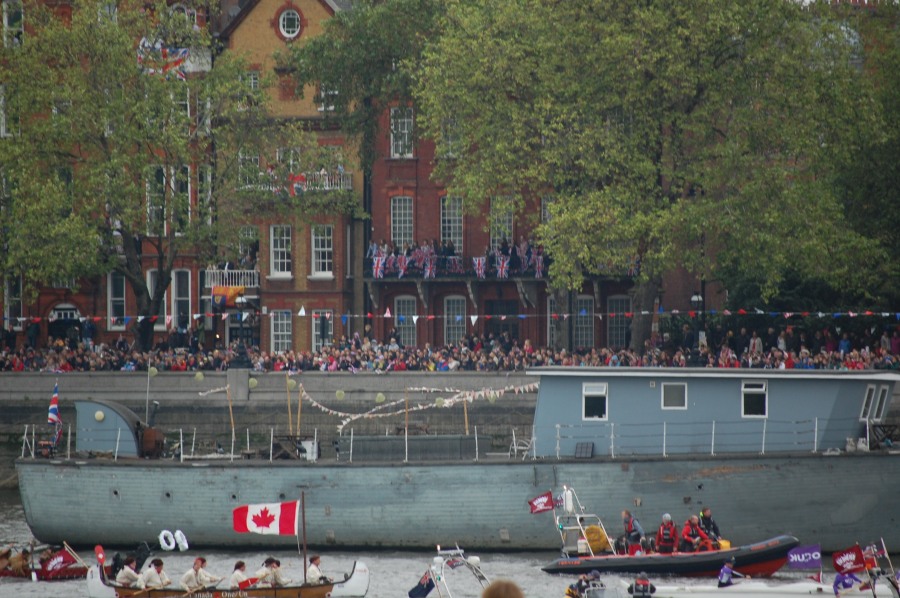In my last post I tried to start a discussion on the use of dialect and idiom in fiction. I expected people to exclaim Faulkner! and James Joyce! in the comments – those masters of voice. Although the teachers in the Masterclass that I attended cautioned us against excessive use of dialect, recommending a few exemplary phrases and then dropping them once into the story, it is not now unusual for writers to use voice, whether through dialect, idiom or rhythm, to establish character.

Canada’s canoe in flotilla on Thames; we stood at back of crowd to left of balconies and didn’t see this. By http://lifeasthewife.co.uk/2012/06/04/photo-blog-diamond-jubilee-flotilla/
As I write, celebrations for the Queen’s Diamond Jubilee are ongoing. On Sunday we went to the river to watch the crowds watching the flotilla and then went home and shivered in front of the TV to watch the rest. Which got me wondering how big the crowds were in 1897.
What can the Queen’s Diamond Jubilee have in common with dialect? Ah, well, it depends which queen and which jubilee. Have a look at this use of dialect, which I doubt would get published today. Here is the first verse of “The Habitant’s Jubilee Ode”:
I read on de paper mos’ ev’ry day, all about Jubilee
An’ grande procession movin’ along, an’ passin’ across de sea,
Dat’s chil’ren of Queen Victoriaw comin’ from far away
For tole Madame w’at dey t’ink of her, an’ wishin’ her bonne santé.
The habitant’s explanation covers the Plains of Abraham and likens the Queen to an adopted mother who is nice. The habitant goes on to say that with the new regime not much has changed: “w’y it’s jus’ lak’ it be before./Spikin’ Français lak’ we alway do, an’ de English dey mak no fuss…” You can read the whole poem here. The author, William Henry Drummond (1854-1907) was a doctor in Montreal. According to The Oxford Companion to Canadian Literature, his “distinctive dialect verse” was Canada’s most popular poetry at the turn of the century.”
This poem appeared in his first collection, published in 1897. In Drummond’s preface to his collection, he professes to have written this dialect not “with any thought of ridicule” but with love, having lived “side by side with the French Canadian people.” In 1884, Mark Twain also felt the need to preface his use of dialect in Adventures of Huckleberry Finn, concluding “I make this explanation for the reason that without it many readers would suppose that all these characters were trying to talk alike and not succeeding.”
The Companion points out that not everyone saw the love, such as La Patrie in 1901, which called “cet idiôme bâtard” a travesty. Montreal poet Louis Dudek praised Drummond’s break with tradition, arguing that his use of dialect “made it possible to free language for the expression of real life and human character” (as quoted in the Companion, from his Selected Essays and Criticism 1978).
Surely, though, the highest praise is to be imitated, as Drummond was by Alexander M. Rose, who also wrote a Jubilee poem, which pretends to be by Jean Baptiste Trudeau and begins: “W’en Queen Victoria calls her peup’s/ For mak’ some Jubilee,/ She sen’ for men from all de worl’ –/ And from her colonie.” I found this on one of my favourite online resources, University of Toronto’s Representative Poetry Online. I found other jubilee poems on www.canadianpoetry.ca, such as “Victoria,” written by William W. Campbell for the 1897 Diamond Jubilee.
Just as I was wondering what Campbell and Sara Jeanette Duncan thought of Drummond’s work, I came across the plodding rhyme of James McIntyre’s “Queen’s Jubilee Ode, 1887,” and flipped the question around. What did Drummond make of such Victorian poetry as McIntyre’s, as in the last stanza of the Ode: “Britain’s empire is extending,/ Truth and justice ever blending,/ May strife and discord ever cease,/ And jubilee inaugurate peace.” But hold, how can we fault McIntyre, who wrote “Ode on the Mammoth Cheese Weighing over 7,000 Pounds”? Was Drummond reacting to, or writing in opposition to, McIntyre’s dull verse?
Today we would likely agree that Drummond’s use of dialect was perhaps too much of a good t’ing. The fact remains that in 1887 and 1897, several poets in Canada were inspired by the Queen’s Jubilee to write a tribute in verse. Here in England, the poet laureate, Carol Ann Duffy, released a commemorative volume of poems, Jubilee Lines, which selects 60 poets for 60 years. Thus I await the Canadian poems for the 2012 Queen’s Diamond Jubilee. Who knows if there will ever be another?


nice piece here, Debra… impressive, because nicely researched, and brought me back to Drummond and all those 19th century Canadian poets we read in school without any social, or political, or moral, or even poetic criticism “back in the day”… You are on to such a fascinating topic here, about VOICE, and how trying to duplicate it, when the voice is speaking “another” English, can look somehow as if it has the intent to degrade, when that is so often not the case. But how to tell the difference? Perhaps here is where Content can right the balance…. admiringly yours, Isabel
LikeLike
Speaking of poet laureates, did you know that Canada has one? Fred Wah right now. http://www.parl.gc.ca/About/Parliament/Poet/index.asp?language=E¶m=2
LikeLike